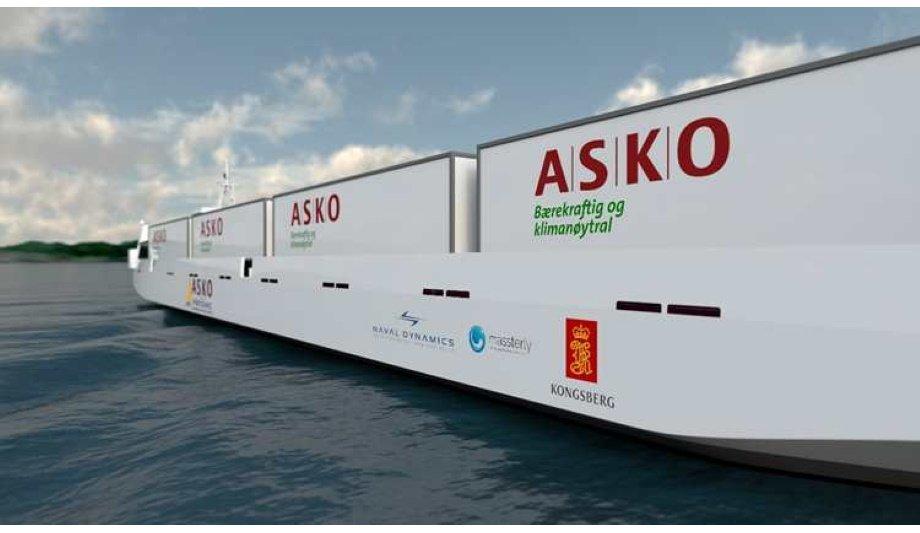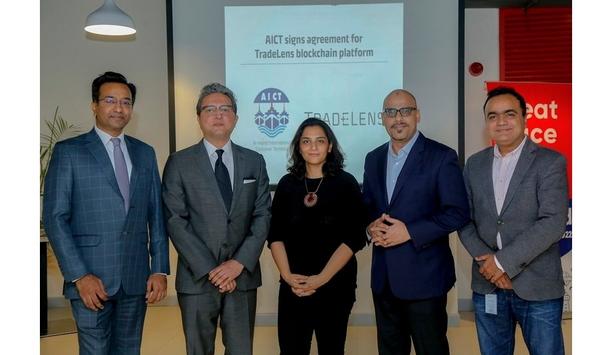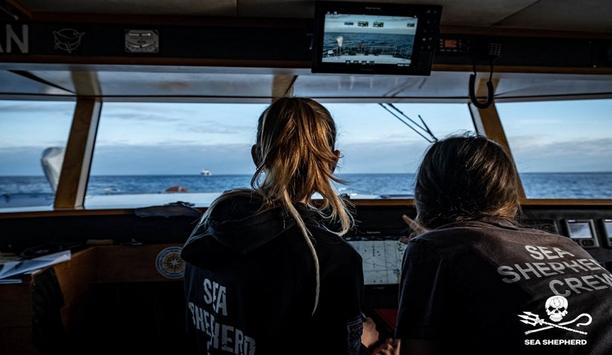Kongsberg Maritime and Massterly (a Kongsberg Wilhelmsen joint venture) have signed contracts with the renowned Norwegian distributor firm, ASKO Maritime AS (ASKO), to equip two new vessels with autonomous technology, and to manage their operations at sea.
With Norwegian companies delivering around 60% of the investment, this is a major milestone for the growth of sustainable maritime operations in Norway. The fully electric ships will replace 2 million kilometres of truck transport, saving 5,000 tonnes of CO2 every year.
ASKO – currently transporting their cargo by more than 800 trucks daily – is committed to sustainability and is investing heavily in new technologies such as electric and hydrogen-powered vehicles.
New RORO (Roll on, Roll off) vessels
At present, road transport is the single mode of transportation to link their warehouses on the western side of the Oslo fjord with their distribution centre on the eastern side. The new RORO (Roll on, Roll off) vessels will replace the current solution with a zero emission transport alternative.
Kai Just Olsen, the Director at ASKO Maritime AS, said “We have a clear ambition to be climate neutral and have set ambitious goals, including being a self-sufficient provider of clean energy and having 100% emission-free transport by 2026. These innovative ships are the key to fulfilling that ambition and will form an essential component of a zero-emissions logistics chain linking our facilities.”
Cost effective and sustainable solution
This solution is cost effective, sustainable and will remove trucks from a heavily trafficked road"
Kai Just Olsen adds, “Fully electric trucks will take the cargo between the warehouses and the ports of Moss and Horten, and in shipments of 16 the trailers will be transported across the fjord on the battery-driven vessels. This solution is cost effective, sustainable and will remove trucks from a heavily trafficked road.”
ENOVA has supported the project – including the required port infrastructure – with 119 MNOK, in line with the Norwegian society’s commitment to reduce emissions and transfer transport from road to sea, where feasible.
Kongsberg Maritime – Wilhelmsen partnership
Kongsberg Maritime has a proven track record as an enabler for sustainable maritime logistics, and this ability has been further strengthened through the partnership with Wilhelmsen.
The vessels will be equipped with the technology required for zero emission and unmanned operation by Kongsberg Maritime, while Massterly will ensure ship management and safe operations from their shore-based Remote Operations Centre. The two vessels will initially operate with a reduced crew, before moving towards unmanned voyages.
Developing autonomous, electric solutions
Egil Haugsdal, the President of Kongsberg Maritime, said “When we teamed up with Wilhelmsen to form Massterly, this was exactly the kind of project we wanted to enable. By working together with us to bring autonomous, electric solutions into everyday use, ASKO are helping to achieve a sustainable, safer future for maritime operations, while also demonstrating the efficiencies these technologies can deliver.”
The ASKO contract illustrates how Massterly is the key in making autonomy a reality for short-sea shipping"
Thomas Wilhelmsen, the Chief Executive Officer (CEO) of Wilhelmsen Group, stated “The ASKO contract illustrates how Massterly is the key in making autonomy a reality for short-sea shipping. We are proud to be the world’s first ship management company to operate unmanned vessels for commercial use. Now, we are one step closer to our goal of enabling sustainable trade - through cost effective, safe, and environmentally friendly logistics.”
Since the ASKO operation lies within Norway’s coastal jurisdiction, the Norwegian Maritime Authority (NMA) must be satisfied that a sufficient level of safety has been achieved, before they will issue an approval of operation for these vessels.
Detailed risk assessment by NMA
The Norwegian Maritime Authority (NMA) will, therefore, follow the project through a detailed risk assessment, based on IMO 1455 guidelines, with regards to equivalent and alternative designs, new technology, verification, and approval for operation. DNV GL will also support this process as an independent third party.
The vessels, which are due to be delivered early in 2022, have been designed by Norwegian vessel designer - Naval Dynamics and will be constructed at the state-owned Cochin Shipyard in India. The functionality enabling autonomous operation will be implemented and tested after arrival in the operational area in the Oslo fjord.












